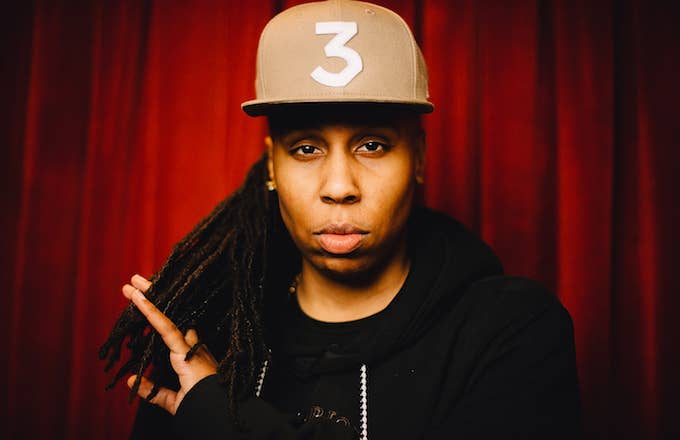
No one would fault you if the first time you learned of Lena Waithe was as Denise, Aziz Ansari’s best friend on his hit Netflix show, Master of None. Waite also writes on the show, and last year became the first black woman to nail an Emmy Award for Outstanding Writing for a Comedy Series. You should, however, be deeply ashamed if that’s the only Waithe project you know, even though, to be fair, the actress, writer, and producer has a very long list of achievements. There’s The Chi, which Waithe created and executive produces, which has been picked up for its second season. She also produced Step Sisters, a comedic dance film on Netflix; and is the writer-producer of an upcoming TBS show called Twenties, which will be loosely based on her life when she first moved from Chicago to Los Angeles. She will also have a role in Steven Spielberg’s Ready Player One, premiering March 23.
Waithe, a proud queer woman in Hollywood aware of how rare that is, was profiled by Vanity Fair’s Jacqueline Woodson. In the interview, Waithe spoke openly about her work process, how her Emmy affected how she functions in Hollywood, and how she’s inspiring the next generation of queer, black kids to follow their dreams.
“How has the Emmy changed me? It got me all these meetings that I go in and say I’m too busy to work with you—you should have hollered at me,” Waithe says of her Master of None win back in November. “You can take my call when I call you about this black queer writer over here who’s got a dope pilot, or this person over here who’s got really cool ideas, or this actress who’s really amazing but nobody’s seen her.”
Waithe is particularly aware of how there’s still plenty of work to be done to make Hollywood a more diverse place, Emmy or no Emmy. “The hardest thing about being a black writer in this town is having to pitch your black story to white execs,” she says. “Also, most of the time when we go into rooms to pitch, there’s one token black executive that sometimes can be a friend and sometimes can be a foe.”
“I wonder if they think it makes me more comfortable, if that makes me think that they’re a woke network or studio because they’ve got that one black exec,” she muses. “It feels patronizing. I’m not against a black exec. I want there to be more of them.”
Whereas the difficulty of the work might discourage some, Waithe is undeterred and just keeps working. “Here’s the irony of it all,” she says. “I don’t need an Emmy to tell me to go to work. I’ve been working. I’ve been writing, I’ve been developing, I’ve been putting pieces together, and I’m bullets, you know what I’m saying?”
Waithe’s long list of projects, coupled alongside Issa Rae’s Insecure, or Ava DuVernay’s back-to-back historic 100 million dollar movies, and the moment Black Panther continues to enjoy, might make it seem like we are currently living in a moment of change. Waithe celebrates these moments, but knows that it’s hardly indicative of any kind of lasting change.
“It was a symbolic moment when Moonlightliterally took the Oscar out of La La Land's hand. It is a symbolic moment when Issa Rae’s poster is bigger than Sarah Jessica Parker’s,” Waithe says. “Now the hands that used to pick cotton can pick the next box office… See what I’m saying?”
“There’s a shift that’s happening. There’s a transition of power. But we still aren’t in power,” she adds.
“I am tired of white folks telling my stories. We gotta tell our shit. Can’t no one tell a black story, particularly a queer story, the way I can, because I see the God in us,” she says. “James Baldwin saw the God in us. Zora [Neale Hurston] saw the God in us. When I’m looking for myself, I find myself in the pages of Baldwin.”
“I didn’t realize I was born to stand out as much as I do,” she adds. “But I’m grateful. Because the other black or brown queer kids are like, ‘Oh, we the shit.’”
You can read the rest of the excellent profile on Vanity Fair.

